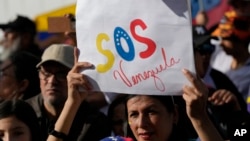The United States announced on Thursday its latest set of sanctions against the government of Venezuelan President Nicolas Maduro.
The U.S. move comes more than a month after the disputed July 28 presidential election in Venezuela and days after the exit of the opposition candidate, 75-year-old Edmundo Gonzalez Urrutia, who was seeking asylum in Spain.
According to a Biden administration senior official who briefed reporters, the Treasury Department sanctioned 16 Maduro-affiliated officials, including leaders of the National Electoral Council (Electoral Council Director Rosalba Gil) and the Supreme Tribunal of Justice (Supreme Court President Caryslia Rodriguez). The U.S. says the tribunal impeded a transparent electoral process and the release of accurate election results.
The senior official said the officials are accused of committing human rights abuses and that military and intelligence individuals have also been sanctioned for their role in post-election repression.
The government of Maduro responded in a statement, saying, "the Bolivarian Republic of Venezuela rejects, in the strongest terms, the new crime of aggression committed by the government of the United States of America against Venezuela by imposing unilateral coercive measures," adding that the decision by the U.S. breaks and violates the agreements signed in Qatar and seeks to impose "regime change" policies on the entire country.
The senior official described the U.S. actions as an important step "to hold Nicolas Maduro and his representatives accountable for conducting electoral fraud, falsifying election results and intensifying repression against the Venezuelan people," adding that the purpose of these actions is to silence the will of the Venezuelans and to "illegitimately extend Maduro rule."
John Kirby, White House national security communications adviser, said this week, "Mr. Maduro needs to heed the call of the international community — and, quite frankly, the Venezuelan people — and release the data so that the whole world can see what the Venezuelan people — who they voted for and that their democratic aspirations are met."
The senior U.S. official noted that overall, the U.S. has sanctioned more than 140 Venezuelan individuals and 100 Venezuelan entities. He provided an example of the regular action taken by the Biden administration against "Maduro and his cronies," when on September 2 U.S. law enforcement officials seized an aircraft in the Dominican Republic that had been illegally acquired by Maduro.
Secretary of State Antony Blinken said during his visit to the Dominican Republic, "with regard to the plane seizures, we've been very clear. We'll implement our sanctions, and if we find violations of them, we will act. That's what we did, and that's what we'll continue to do."
"Cumulatively, the U.S. government has imposed visa restrictions on nearly 2,000 Venezuelan individuals for their role in ... undermining democracy, significant corruption and human rights violations," said the senior U.S official.
But questions have been raised about the effectiveness of the measures as Maduro has stayed the course, and according to U.N. human rights officials, has doubled down on his efforts to jail political opposition members or those who have expressed dissent.
The U.S. stopped short of announcing any new actions against the OPEC member's vital energy sector, which is already under heavy U.S. sanctions.
The senior official indicated "they're constantly monitoring very closely the political and economic developments in Venezuela and are committed to calibrating our sanctions policy appropriately in response both to events on the ground as well as broader U.S. national interests."
The discussions about Venezuela are likely to be part of the U.N. General Assembly in New York at the end of September, according to an administration official who also praised the work of Panama in relation to the post-election response.
The foreign minister of Panama, Javier Martinez-Acha, read a statement Thursday on behalf of 43 nations, saying, "in light of the ruling by Venezuela's Supreme Court, we urge the CNE [National Electoral Council] to immediately publish the presidential election voting results from all polling stations and allow for the impartial verification of results by independent observers to promote credibility, legitimacy and transparent electoral process."
Experts from the United Nations and the Carter Center, which at the invitation of Maduro's government observed the election, determined the results announced by electoral authorities lacked credibility.





